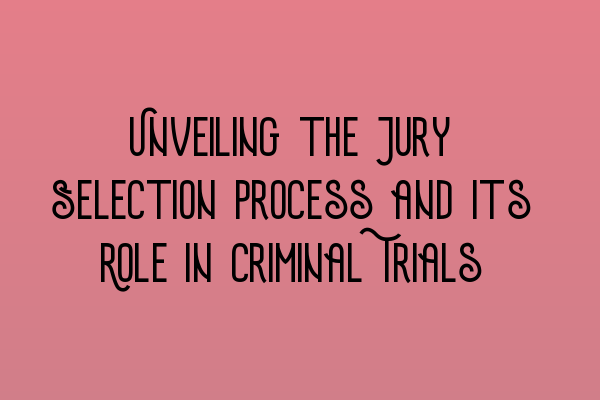Unveiling the Jury Selection Process and Its Role in Criminal Trials
Welcome to the SQE Criminal Law & Practice Law UK blog! In this post, we aim to shed light on the jury selection process and its crucial role in criminal trials. Understanding how juries are chosen is vital for both aspiring solicitors and those interested in the legal system.
In criminal trials, the jury selection process plays a significant part in ensuring a fair and impartial trial. The jury consists of a group of individuals who are tasked with carefully considering the evidence presented and reaching a verdict based on the law. To gain a deeper insight into this process, it is essential to understand its various stages.
The Jury Selection Process: From the Summoning to the Voir Dire
The jury selection process begins with the summoning of potential jurors. In the UK, individuals are randomly selected from the electoral register to form a jury pool. This pool forms the basis for selecting a jury panel, which ultimately sits for a particular trial.
Once selected, the potential jurors undergo a qualification process to determine their eligibility for serving on a jury. This process involves assessing whether the individuals meet the legal requirements, such as age, citizenship, and mental capacity.
After qualification, the potential jurors are then subjected to the voir dire process. In this stage, both the prosecution and the defense have the opportunity to question the potential jurors to assess their suitability for the trial. The goal is to identify any prejudices, biases, or conflicts of interest that may hinder their ability to make an impartial decision.
The voir dire process plays a crucial role in ensuring fair trials. It enables solicitors to identify jurors who may have personal connections to the case or who may harbor biases that could impact their judgment. By eliminating potentially biased jurors, a fair and unbiased jury can be selected.
Factors Considered in Jury Selection
During the voir dire process, several factors are considered when selecting jurors for a specific trial. These factors include:
- Prior knowledge or involvement in similar cases
- Personal relationships with individuals involved in the trial
- Steering potential jurors towards a particular outcome
- Residency in the relevant jurisdiction
- Potential conflicts of interest
- Lack of understanding of the legal system
By carefully assessing these factors, solicitors aim to construct a fair and impartial jury that will fairly evaluate the evidence presented during the trial.
The Role of the Jury in Criminal Trials
Once the jury selection process is complete, the chosen jurors take on a critical role in criminal trials. They serve as the fact-finders, carefully evaluating the evidence, listening to witness testimony, and considering legal arguments presented by both the prosecution and the defense.
It is the responsibility of the jury to weigh the evidence and determine the guilt or innocence of the accused. This duty requires the jurors to apply the law as instructed by the judge and come to a unanimous or majority decision, depending on the jurisdiction.
The unbiased and impartial nature of the jury selection process is of utmost importance. It ensures that defendants receive a fair trial, free from prejudiced judgments that could impact their fundamental right to justice.
Stay Informed and Prepare for SQE
If you enjoyed this article and are preparing for the SQE exams, we encourage you to check out our related articles and resources:
- SQE 1 Practice Exam Questions
- SQE 1 Practice Mocks FLK1 FLK2
- SQE 2 Preparation Courses
- SQE 1 Preparation Courses
- SRA SQE Exam Dates
These resources will provide you with valuable practice materials, course options, and essential information about the SQE exams.
Thank you for reading this article! We hope it has given you a comprehensive understanding of the jury selection process and its significance in criminal trials. Stay tuned for more informative content on SQE Criminal Law & Practice Law UK!
